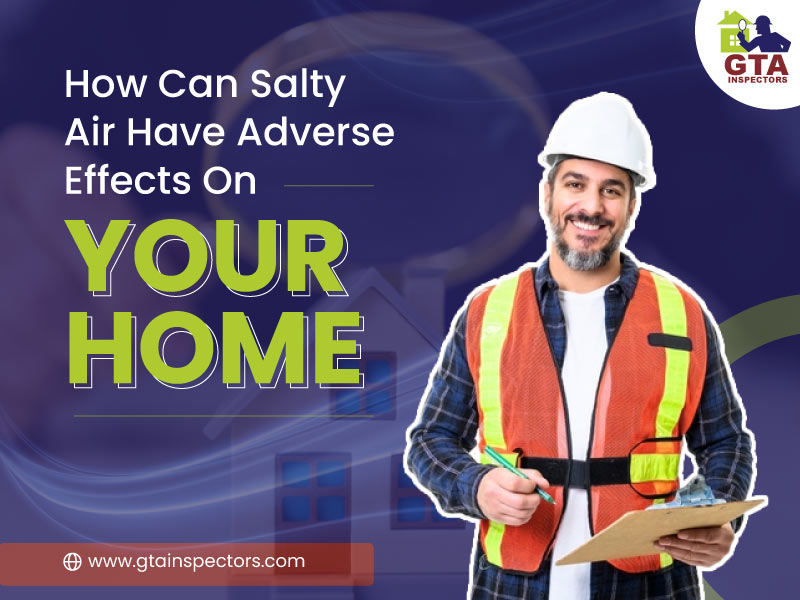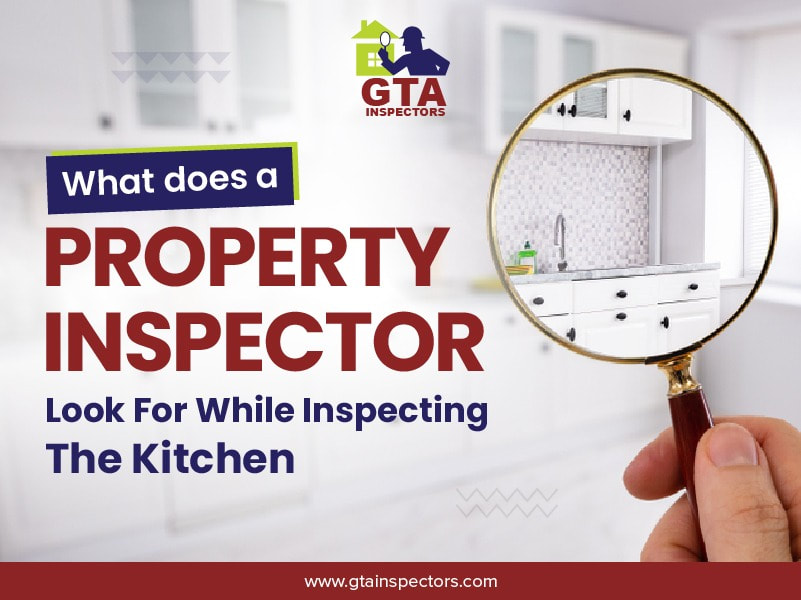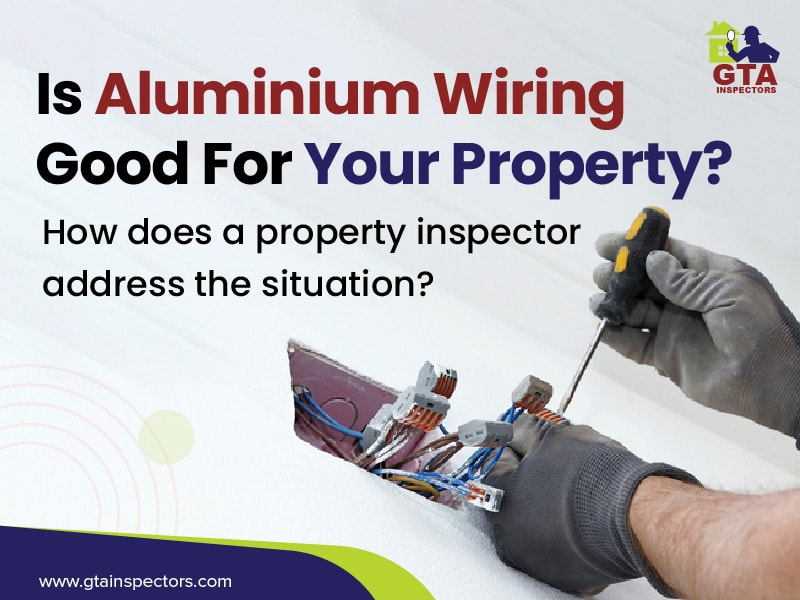|
Reminiscing with our childhoods, weren't we all in love with beach houses? The idea of staying beside the beach and enjoying the sunsets is a dream for every homeowner. But what they need to know is how this beautiful-looking ocean has impacts on the property.
If you are considering moving out near a coastal region, you must hire a certified property inspector with experience checking coastal properties. LET'S UNDERSTAND HOW COASTAL REGION PROPERTIES ARE IMPACTED BY SALT IN THE ATMOSPHERE. We all know salt is suspended in the moisture near the beach areas. The salt in the atmosphere can result in corrosion — it can quickly penetrate the surrounding materials and settle there permanently once entered. Decay can affect the structural components of your property, business and other buildings. Salty atmosphere corrosion: Salt in the air can critically affect the structural integrity of your property. Studies have revealed that salt air can corrode metal up to 50 miles. The salt in the atmosphere expedites the normal rusting and damaging processes, which might lead to decaying the property's structures – if you won't able to maintain your property with preventive measures. Delignification of Wood: Have you ever noticed the furry material pulled off the wooden structures near the beaches? If yes, then you will be shocked to know that this is caused by salt settling on the surfaces near the beach. The salt penetration into wooden surfaces leads to the formation of fuzzy salt crystals o the lignin; part of the cell wall of the wood is called delignification. To maintain the health of your wooden surfaces, you can regularly splash water on the surfaces to wipe off the salt penetrating the wood. Salt Air Effects on The Electrical Components: The most common impact of salty air is the corrosion of metallic appliances on your property. The electrical components are covered mainly by metallic surfaces – when damaged due to corrosion can cause exposure of naked electrical wiring and dysfunctioning. In the best cases, the electronic device might not work; in other cases, it might lead to corrosion that can cause a fire. Getting your property checked by a property snagging company can save you from unwanted property damage and cause a fire. Salt Deteriorating Walls Structural Integrity: Salt in the atmosphere won't stop here. It might lead to impacting the walls of your property. It has a solid capability to penetrate the walls and degrade them slowly and gradually. Apart from this, the reinforcements used inside the concrete can make it porous and damage the metallic connectors inside the walls leading to structural damage. Effects on metals: The saltwater can also deteriorate the property's stainless steel and titanium components. Have you noticed that many decks have metallic portions that are wholly rusted even after being taken care of? But using suitable quality materials can prevent unwanted corrosion in your property. If you plan to buy a property near the beach, you can opt for vinyl doors and window frames. Vinyl is a robust component used to make beach homes, and it's worth the investment. For the furniture in your yard, you can use aluminium, plastic and composite materials; they are also good alternatives. Exterior Home Care: To maintain the shelf life of your property and its components, you can perform annual pressure washes on the home's exteriors to eliminate salt corrosion. Living near the beach is a huge responsibility of caring for your dwelling. For regular maintenance, follow the tricks below:
Planning to buy a lavish dwelling near the coastal region – do not forget to apply for prior affordable home inspections. Also, remember the important points mentioned in the blog about salt air corrosion while buying the property.
1 Comment
From kitchen countertops to dryer vents;
From pipelines to gutters; From floor to ceiling. Maintaining a home is a continuous process! In gloomy summer weather, especially after COVID hit us, we are more home driven and more likely to stay indoors and stay in a more relaxed zone. Those hot months of the year are more of pool parties, family gatherings, beachy dates, and barbecue parties. But it isn't only about celebrations. When you have to take care of a property, an endless hassle goes along. People often get into house inspections to understand the areas of amendment needed. The offset of winters brings tons of work to homeowners. The home demands a complete switch of everything, from shutting off all the winter wearables in the store to taking out light, comfy, and airy things. And when so much attention to detail is paid only to the decor and aesthetic factors, why should the property's health be lacking? Today, let's catch up on some preventive measures that can help you prepare your home to face the summers while keeping you alert on the weak factors of your house. So, without further ado, let's get started! House's Exterior: A pleasant-looking house might not be a healthy one. When we say to look at the exteriors, it's not a generic view that is expected. You, as a homeowner, must have a keen eye to look over the walls, roof eaves, windows, and door trims. Rainy and snowy winters can leave flaking on the wall paint. Caulking around the exterior doors and windows is another common damage one tends to ignore. But we forget that this air gap could serve as water inlets and lead to severe water damage to the property. Checking out the fencing and patio furniture can help reseal or repaint the damages from the winter season. Trimming out the overgrown vegetation can help harbor rodents and mosquitoes that can lead to health complications. Air Conditioning System Summers call out for the reinstallation of the air conditioners. As homeowners, you must get your condenser unit inspected every summer season for damaged radiator fins. Furthermore, the air conditioners involve checking the evaporators, installing a t-switch, replacing air filters, and other things. These electrical checks are risky for a homeowner. Therefore, you must connect with a certified home inspector to hover over every detailed air conditioner segment and be assured of its condition. Prep up your backyards for the summer get-togethers Summer calls out for frequent get-togethers. But we are sure you would prefer to avoid calling your friends over a clumsy backyard setting. So, it's the perfect time to clean and test your grill to ensure you have a good hamburger or hot dog for a meal. One must look for cracks, holes, and blockages to check the grill's safety. Soffits and Fascia Tiny ceilings extending past the walls are called the soffits, and fascia refers to the outer section above the soffits. Generally, such house extensions are made of wood; hence they are more prone to weather effects. Winter snows and rains can lead to the rotting of the wood. Also, this tiny-miny space allows squirrels and raccoons to penetrate your attic and walls. This might drive you crazy! Rooftops When we say rooftops, it is evident that you will need help to get on the roof and start cleaning up the mess around. By checking out the rooftop as a preventive measure, we expect every homeowner to do a visual check and look for peeled edges, moss, or other unwanted wild vegetation. If so, you must contact a property snagging company that can help you with detailed information. We hope we helped you with something like first-aid to make your home summer ready! But if there are areas of your property you need help to hover over, the most trusted professional snagging company - GTA Inspectors, is just a click away. We can help your home get ready for the summer heat! Going through every nook and cranny in the house is quite crucial when it comes to property inspection. There can be defects in the property that might be missed by a rookie, but to an experienced eye it can easily tell how the problem might develop in the future. Listen to the full podcast and get expert opinion by “Ehab Farid” on the importance of a thorough property inspection.
People today are generally seen settling in nuclear families and do not necessarily believe in having bungalows. Instead, they intend to go for small and detached living where a building has several separately owned apartments or houses.
And what better than a Condo? Condominiums are a great housing option for people nowadays. But when the construction type changes, certain things do need consideration as a condo buyer to ensure the purchase of the perfect property. Getting any property checked by a professional home inspection company is one thing. But the snagging process's dimensions change when we talk about a condo. So, when we say condo today, especially in a place like Dubai, a general eye-view is of the grand skyscrapers launching high into the sky. But is it only one? No, right! Today's world is dominated by a construction culture more inclined towards buildings and complexes, and people choose to live in privacy and safety. In such a case, reviews, property inspectors, and homeowners also include another set of people who will help get you through the process. They are HOA(Homeowners Associations) for the building or complex. HOA takes charge of the repairs and maintenance that any condo faces. Snagging inspectors generally are coordinated with HOA when the repairs are suggested. So, let's check out what is covered in a condominium inspection while highlighting the ones excluded from this particular kind of property inspection. Unlike a general property inspection, condo inspections generally undergo a kindred process. Every condominium inspection will cover the major systems of the property, like the-
But mainly, what a condominium inspection would only hold includes a few things. So, let us catch up on them one by one. And because the condominium buildings, societies, or rather complex structures share some common areas, your home inspector's snagging process will get restricted in terms of space and accessibility. The Realtor shares the checklist for the do's and don'ts. So, without further ado, let's check out the things!
So, if you are on your way to making a condominium deal, you have an initial picture with you now! Purchasing a condo can be an exciting voyage to make some beautiful memories and scenic views. Although there are a few things that should be listed in the checklist of a property inspector, there are many more that are included. So, if you need help configuring the best way out, GTA Inspectors- the best home snagging company in Dubai- is here to unbox what your condo has in for you! Yes!
Inspectors are allowed to test the electrical panels present on your property. Examining the working conditions of your property's electrical panels or panel boards, is vital to any commercial property inspection. A professional home inspector is expected to have certified knowledge and understanding of the International Standards of Practice for Inspecting Commercial Properties (ComSOP) to evaluate your electrical panels' safety critically. Now let's understand Why or Why not a Home Inspector checks your property's electrical panel. Why Would a Home Inspector Open an Electrical Panel? The ideal way to accurately test and examine a panel board is by opening the panel and observing the following: Service entrance connections - This is the part where service wires connect to the main service panel. Service disconnect breaker - The main service breaker is utilized to cut complete power to the service panel. Panel board components- This portion includes parts like the bus, neutral, and grounding bars. Fuses - A fuse or breaker is used for linking the branch circuit wiring. Bonding - When other metallic systems are linked with the grounding electrode systems. Wiring connects - There are wiring lights, outlets, and mechanical breakers. The professional snagging inspector can visually inspect the electrical panels by opening their panels. Through this inspection, they try to detect damaged wires, rusting or burned signs on the bus bar, double-tapped wiring, and improper connections. The home inspector further mentions the issues found in the inspection report. They recommend you take immediate guidance from a licensed electrician. Only licensed electricians should be hired to work on your electrical panel. Why would a Home Inspector not consider examining your electrical panel? Here are some relevant reasons a home inspector won’t consider inspecting your electrical panel.
During an inspection, there are some instances where the electrical panel won’t open. The electrical panel might be blocked by furniture and equipment or multiple obstructions so that there are zero chances of checking. An electrical panel should ideally have 3 feet of the workspace area. But there are older homes which don’t have such conveniences. Also, there are times when the panel box is overpainted, resulting in sealing the cover or opening of your electric panel. These were some of the reasons why an electrical panel won’t open hence it will lead to an unsuccessful panel inspection. Safety Issues that prevent home inspectors from opening the panel: Live dead front cover : Every home inspector tests an electrical panel box with a circuit tester to determine if the electrical current is in the metal box's dead front cover. This issue might occur only when any live wire is touching the cover. No main service panel: Many electrical panels don’t have any service disconnects. The main service disconnect allows for cutting down all the power to the breakers and branch wiring, allowing the home inspector to remove the panel cover safely for visual inspection. It doesn’t mean a home inspector won’t inspect a live panel box, but it can be considered a safety concern. Rust or water presence- If rusting and water are present near the panel area, the inspector would immediately recommend calling a licensed electrician to inspect, as the issue might be life-threatening. Finally, expect a home inspector to open the panel cover to examine the electrical panel visually. If your hired service inspector doesn’t open the panel, ask them why. A home inspector should also consider clicking pictures of the panel so that they can be added to the report for better understanding. We at GTA inspectors cater to our clients' inspection requirements with dedication and determination. To make your investment successful. When we say "Purchasing a house!!!"; tons of excitement goes around. People go into the minutest details to make the best choice. And amongst those deciding factors, a crucial one is the climatic condition of the place or city you choose to settle in.
And if it's Dubai, you need to be even more careful! Dubai has a hot desert climate, making it even more challenging for builders and dwellers to strike the right balance for a perfectly constructed nest. Also, the place experiences a certain extent of humidness due to its proximity to the sea. And at such sites, it's not only the humid air that can cause the damage; the soil here is also damp. We, as property inspectors, come across various instances where people ask for advice on how they can keep up with the temperatures of their house. After all, nobody would like their home to feel like a sauna. All that moist and heavy air can put you into dozens of problems. And by problems, we mean- mould growth, poor indoor air quality, wood rottings, grooming grounds for bacteria, and ample health concerns. But what can be done to fix or be crisper with requirements- How can we avoid such problems? When we talk about the energy consumption and efficiency of a house, the discussions around the topic are all about the cooling and heating systems of the house. And this energy also depends upon the humidity in the climate. This can devastate furniture, appliances, floorings, carpeting, and people. GTA Inspectors is here with a few things that can help address the situation for you! 1. Keep a sparing view of your window: Letting your window open on a hot day might sound deranged, but it will factually help! Do you know how? Giving open space for the inside air to pass helps regulate the air within the house. Stagnant air also works as a catalyst for humidity levels. But keeping those shutters open for long can be damaging too. So, please don't overdo it when you try to release the humid air. 2. Gardening skills can be brushed up: Studies have shown that a green environment can lead to a clean environment. Installing a garden could work wonders for your house. Why? In our years of experience as a property snagging company, we found that houses with gardens are generally cooler and experience a sense of freshness in the surroundings. House plants help reduce humidity levels by extracting many nutrients from the air that help reduce moisture. 3. You can opt for several flooring options: Carpets are key holders of moisture and retain a lot of humidity, leading to increased temperatures in the surroundings. When you plan to live in a humid climate, opting for stone or tile flooring can help bring down the house's temperatures. 4. Installing a dehumidifier can be an option too: Several dehumidifying devices available in the market today can be a rescuer to address humidity problems. You can choose the best fit from dampness protection models, odour eliminators, high capacity, and other factors. 5. Venting the stove and bathroom fans outside the house could help: Exhaust fans in the kitchen and bathrooms are a saviour! Venting out those into the attic will fetch a better solution. Rather, angling them outside the house could be an option. This will help release humid air outside the house and eventually help in a cooler atmosphere. 6. Insulating water pipes: When temperatures in the water pipes and the outside atmosphere differ, there are high probabilities of condensation. Therefore, insulating your house's pipelines can help address the home's humidity problems. Insulating the hot water pipes curbs away the heat loss between the water heater and the water tap, resulting in heating and using minimum water over time. We hope we have helped you figure out some of the most basic home remedies you can opt for to keep your home free from humid climates. And if still controlling the temperatures is a problem at your home, GTA Inspectors- the best home snagging company in Dubai is here to help you out. So, next time you experience a heating sensation within your home, remember it's not the heat; it's the humidity. A buyer is spending a large amount of money on the property hence you can expect them to be smart enough to study the property comprehensively before investing.
Buyers are guided about the property during the walkthrough process, but there is much to reveal about the property that is not visible to untrained eyes. On the other hand, a seller is responsible for providing the potential buyer with a disclosure statement explaining the property's general conditions. A buyer can also conduct a snagging home inspection to understand the property better and save themselves from investing in a lemon house. Let's understand more about disclosure statements. Are you curious about understanding the role of property disclosure statements?
Here is some impetus of the Property Disclosure Statement:
Why does a property inspector have property disclosure statements? To recap: a property disclosure is a statement the property seller provides to the buyer after the buyer has made an offer to purchase. This disclosure statement is filled by the property owner, which mentions the state of the property and the requirements. This document is responsible for informing the buyer about the potential issues in the property, along with the history of other repairs done. The further step the buyer must not miss is hiring a qualified property inspector to verify the issues mentioned in the disclosure agreement and highlight the ones not mentioned in the statement. Most buyers think of waiving off the professional property inspections when the seller provides the disclosure agreement, so why must you carry out a home inspection even after having the disclosure statement in hand?
How to Make a Property Disclosure - Every state has its own terms and conditions regarding property disclosure statements. Most of the forms will provide you with a checklist to tick along with some extra room to add some more details about the property issues. This statement will be submitted to the buyer once they have accepted the offer. However, the buyer can break the deal if they cannot adjust to the seller disclosure statement without losing any of the deposit amounts. Depending on how brief you want your forms to be, there are main areas and details that need to be supplied. The important you cannot skip in a Property Disclosure Agreement is added below:
It will be beneficial if you submit a copy of the disclosure statement to the certified property inspector, who can use it as a guide during the inspection. For example, if a water pipeline issue is mentioned in the statement, the inspector will remove extra time to check the issues thoroughly. An up-to-scratch inspection can only occur when all the parties work together – the seller, the buyer, and the snagging inspector. Hence, giving the property inspector one copy of the disclosure statement will help them make the most of the inspection for you. We at GTA Inspectors have years of experience building trust between buyers and sellers with our unmatched inspection services and information blogs. Stay stunned with us to know more about the property inspection. While performing a home inspection in your property, the inspector will likely spend 30% of your time inspecting your kitchen. A kitchen is the most integral part of your dwelling, and making sure that everything works properly in that space takes a bit of time.
At GTA inspectors, we provide inch-perfect inspection services that ensure your invested money is valued. If you are looking for a reliable property inspection, call us. There are areas in the kitchen that require an inspection to check the functionality. A well-performing kitchen relies on well-functioning appliances and a plumbing system. If you have a home inspection lined up for your property, check out the 7 specific things an inspector looks for while inspecting. 1.Electrical Issues- Electrical issues are the most commonly found and neglected issues in any property. The kitchen is part of the property with electrical appliances, so it needs an inspection. Finding an electrical problem in your home, especially in the kitchen, puts you and your loved ones at risk. Your kitchen's electrical receptacles and wiring require a protected heavy gauge. As the appliances in the kitchen need heavy electrical support, the thin wiring may lead to burnout. Your kitchen must be supported with a thicker and more planned wiring arrangement. A home inspector with help you ensure the safety of your dwelling. 2.Plumbing Problems- Home inspectors are also found looking for plumbing problems in your home. The plumbing issues start from small leaks from the kitchen faucet to major leaks that can damage your home's foundation. A home inspector will help you spot the problems before it's too late. Saving you from expensive repairs and giving you the upper hand while negotiating with the sellers. Sometimes the issue may seem minor, like water drops leaking from your sink, which can lead to mold infestation. 3.Kitchen Cabinets- It can be considered an optional item when it comes to professional property inspection. Yet there are times when inspectors look into the kitchen cabinets for issues like the working condition of the doors, lights near the cabinets, cleanliness, and mold infestation. 4.The Range Vent- A vent is used to dump the steams from your home and block unwanted greases generated while cooking. This part of the kitchen is also responsible for kitchen safety and fire prevention. But sadly, most people install vents as decoration and not for their ideal use. Therefore the kitchen is checked explicitly by the home inspector to make sure that it is in good working condition. 5.Mold and Mildew Ignoring the most minor mold infestation can infect your kitchen without noticing. Mold is perhaps the biggest threat to property buyers and investing, as no one is interested in putting their investments into a lemon house. If you are a seller who has a mold problem in your home, there are minor chances for your property to get sold. If the inspector spots the mold infestation before you do, it might cost you much more than expected. Being a seller is hard to eliminate such issues as the buyer will ask you for the repairs or negotiate with the property rates. The kitchen is the most favorable place for the nesting of mold and mildews hence take care of the property before its too late. Home inspectors look for a wide range of issues from those mentioned above. As a homeowner, always get the repairs done when you spot the issues. And if you are planning to buy a property, ensure that you hire a top-class inspection service provider. We at GTA Inspectors cater the best-in-class inspection services with certified inspectors. If you are interested in hiring an property inspection service for your property connect with us now! Is Aluminum Wiring Suitable For Your Property? How Does A Property Inspector Address The Situation?3/17/2023 Are you buying a property with aluminum wiring? Then you must reassure yourself if it's the right decision to make.
We at GTA Inspectors provide top-class inspection services and understand the horrors of buying and selling a home with aluminum wiring. Read this blog further to know why you must think before investing in a property with aluminum wiring. What is aluminum wiring? Aluminum wiring is a type of electrical wiring that uses aluminum alloy and not copper. Aluminum wiring has some different physical properties than copper. It's less conductive and softer than copper and expands more when exposed to heat. Here are some unique factors of aluminum wiring you need to consider while choosing one for your home.
Aluminum Wiring and Home Inspections What Should You Do Before Buying a Home with Aluminum Wiring? We suggest that you take the following actions before buying the home:
What Home Inspectors Look For While Inspecting: While buying or selling a home with aluminum wiring, you must get a property inspection done. The inspector will check if any single-strand aluminum wiring is on the property. There are some remedies home inspectors will look for to mitigate potential hazards. Copalum crimps - Copalum crimps the aluminum wire into a copper wire with a specially designed sleeve and crimping tool. Pigtailing - Pigtailing is less expensive than the other to merge the aluminum and copper wiring. This method is not frequently preferred. The home inspector might look for this as a possible remedy. CO/ALR Switches and Outlets - The inspectors will always look for the outlets and check if they are the best suited with aluminum wiring. Conclusion: The concerns mentioned above are a fundamental reason to get your property inspected. If you are still looking forward to buying a property with aluminum wiring, you can move forward with the negotiations with the sellers. You can mention splitting the price of rewiring and mitigation options with them. Ultimately, if you love the property, modifications and adjustments can be made. We hope that you found this information helpful. If you have any questions about home inspections, please contact us. GTA Inspectors provide quality inspection services to ensure you're confident in your assets. A house is a home once one starts relating himself to the place. In our previous informative segments, we hovered around everything that a house includes. But we should have pondered upon a significant part of the property. It is the house garage!
Residential property inspections are generally seen to have a thorough look-out at the premises of the property. In the due course, we have often encountered residential properties with a separate segment- probably some nails, equipment, and machinery. Well, bonus points for getting it right! Today we would like to highlight your attention to the garage along your breezeway. When one gets into the thought process of building a home for oneself, one expects the property to be inclusive of everything. One of the most common expectations of modern house owners today is that their property must include a garage to park their vehicles and give time for maintenance and repairs. So today, we shall look at what is in a garage inspection and what aspects this covers. The first thing to ponder is the intent that whether your property has a detached garage or a carport, you must ensure that your inspection process does cover rigorous garage snagging too. In Dubai, approaches for a perfect home are changing swiftly, and people are evolving in terms of the property's designs, decor, functionality, and safety. Therefore, it is common today to find houses with garages constructed alongside the breezeway of the property or the backyards. And when you start with inspecting the garage, the first and foremost thing is to check whether the design complies with the laws of the land, i.e., there is adherence to the building regulations. As an age-old property snagging company, we have experienced quite a few instances where compliance with the laws has led to demolishing of the garages. And inspections become the point of validation for such structures. Hence, having prior knowledge of land laws can help save you from unauthorized constructions on your property. Once you have a green signal on the structure and design, the next thing to consider for the garage inspection is to hover over the slope and drainage. A classic garage structure is that with a concrete or tin slab with sufficient space for drainage. When property inspectors enter the picture, they look, evaluate, and examine the cracks and distortion and the slope of the garage too. Drainage becomes an essential factor during the monsoon season, as when the rains hit, there are chances of blockage or overflow of water from the slope of the garage. Therefore, property inspectors thoroughly examine the coordinated function of the slope and drainage together. And this shall also include the detection and valuation of moisture on the slab that could initiate spalling damage and many other related issues. Once the slope and drainage system is checked and verified, the next step is to check for the structural sturdiness of the garage. The professionals conducting the snagging process check for the overall operational aspects of the garage at this step. This is considered the most comprehensive phase of the entire process as everything, including the mechanical, electrical, structural, and ventilation, is adequately checked at this time. It includes a sincere check on the garage's walls, frames, and ceilings. After this wholesome check, the process moves to the next stage, where the property inspectors shall pen down every minute observation of the garage into a document that, by now, everyone is familiar with! Yes, you guessed it right; it is the inspection report that we are referring to! And with the details and suggestions furnished in the report, you must go ahead with your take on amendments in your garage and include what could benefit you in the long term. Now that we have familiarised you with what goes behind a perfect garage inspection, we assume you will consider having and maintaining a garage for yourself. But if you still find a moist slope, a cracked drain, or a mould at the side wall; GTA Inspectors are always at the rescue! |
AuthorWrite something about yourself. No need to be fancy, just an overview. Archives
July 2024
Categories
All
|











 RSS Feed
RSS Feed
